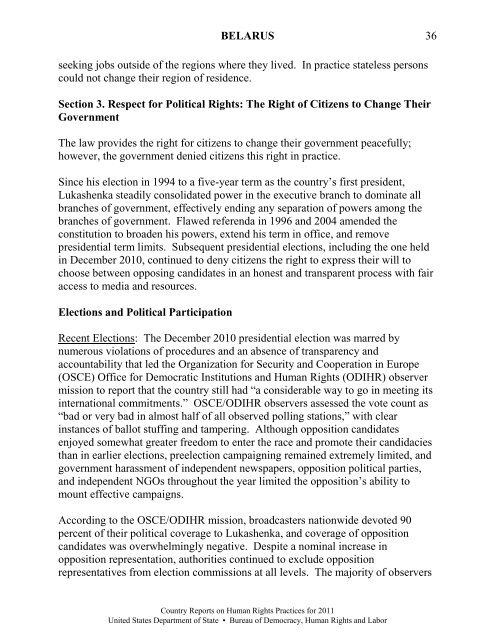belarus executive summary - US Department of State
belarus executive summary - US Department of State
belarus executive summary - US Department of State
Create successful ePaper yourself
Turn your PDF publications into a flip-book with our unique Google optimized e-Paper software.
BELAR<strong>US</strong> 36<br />
seeking jobs outside <strong>of</strong> the regions where they lived. In practice stateless persons<br />
could not change their region <strong>of</strong> residence.<br />
Section 3. Respect for Political Rights: The Right <strong>of</strong> Citizens to Change Their<br />
Government<br />
The law provides the right for citizens to change their government peacefully;<br />
however, the government denied citizens this right in practice.<br />
Since his election in 1994 to a five-year term as the country’s first president,<br />
Lukashenka steadily consolidated power in the <strong>executive</strong> branch to dominate all<br />
branches <strong>of</strong> government, effectively ending any separation <strong>of</strong> powers among the<br />
branches <strong>of</strong> government. Flawed referenda in 1996 and 2004 amended the<br />
constitution to broaden his powers, extend his term in <strong>of</strong>fice, and remove<br />
presidential term limits. Subsequent presidential elections, including the one held<br />
in December 2010, continued to deny citizens the right to express their will to<br />
choose between opposing candidates in an honest and transparent process with fair<br />
access to media and resources.<br />
Elections and Political Participation<br />
Recent Elections: The December 2010 presidential election was marred by<br />
numerous violations <strong>of</strong> procedures and an absence <strong>of</strong> transparency and<br />
accountability that led the Organization for Security and Cooperation in Europe<br />
(OSCE) Office for Democratic Institutions and Human Rights (ODIHR) observer<br />
mission to report that the country still had “a considerable way to go in meeting its<br />
international commitments.” OSCE/ODIHR observers assessed the vote count as<br />
“bad or very bad in almost half <strong>of</strong> all observed polling stations,” with clear<br />
instances <strong>of</strong> ballot stuffing and tampering. Although opposition candidates<br />
enjoyed somewhat greater freedom to enter the race and promote their candidacies<br />
than in earlier elections, preelection campaigning remained extremely limited, and<br />
government harassment <strong>of</strong> independent newspapers, opposition political parties,<br />
and independent NGOs throughout the year limited the opposition’s ability to<br />
mount effective campaigns.<br />
According to the OSCE/ODIHR mission, broadcasters nationwide devoted 90<br />
percent <strong>of</strong> their political coverage to Lukashenka, and coverage <strong>of</strong> opposition<br />
candidates was overwhelmingly negative. Despite a nominal increase in<br />
opposition representation, authorities continued to exclude opposition<br />
representatives from election commissions at all levels. The majority <strong>of</strong> observers<br />
Country Reports on Human Rights Practices for 2011<br />
United <strong>State</strong>s <strong>Department</strong> <strong>of</strong> <strong>State</strong> • Bureau <strong>of</strong> Democracy, Human Rights and Labor
















